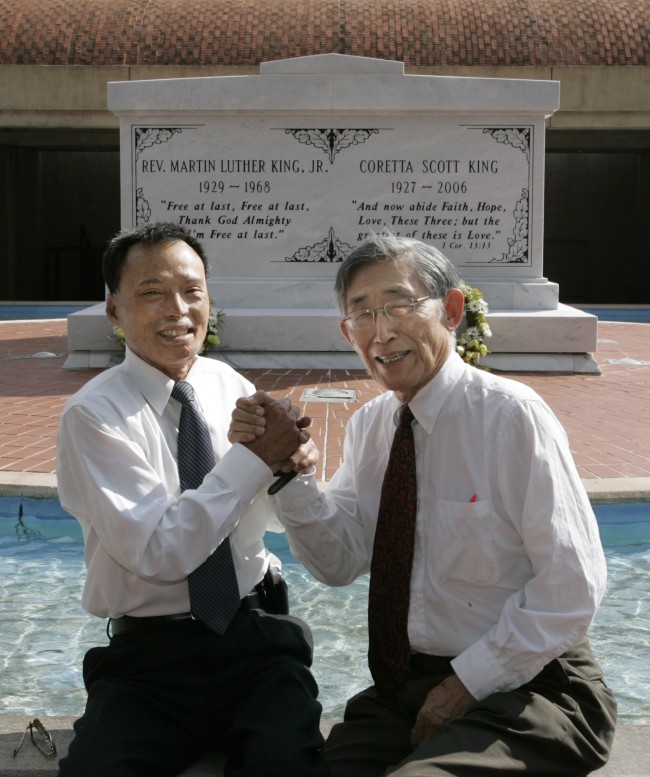Pictured above: Chol Soo Lee (left) and K.W. Lee pose for a picture after paying respects at Dr. Martin Luther King, Jr., and Coretta Scott King tomb at the King Center in Atlanta, Georgia, September 22, 2007. (Photo courtesy of Hyungwon Kang)
by JULIE HA
Chol Soo Lee, a Korean American whose wrongful conviction in a 1973 San Francisco murder case galvanized a historic pan-Asian American movement to win his freedom, died Tuesday at age 62. He passed away at a San Francisco hospital, after suffering medical complications stemming from a digestive system problem that had him hospitalized for two weeks, according to friends.
Lee, an immigrant from South Korea who came to the U.S. around middle-school age, was arrested by San Francisco police in June 1973 for the murder of Yip Yee Tak, a local Chinatown gang leader, who was shot dead in broad daylight. Though Lee was convicted of first-degree murder and sentenced to life in prison a year later, he maintained his innocence. Thanks to a group of Asian American supporters, who rallied to his side, a Korean American journalist by the name of K.W. Lee (no relation to Chol Soo Lee) began investigating the case.
Lee, then a staff writer for the Sacramento Union, would write more than 100 articles that raised questions about Chol Soo Lee’s conviction. Chol Soo was much shorter than eyewitness descriptions of the gunman and had a mustache that not a single witness mentioned to police. Notably, Lee was often identified as Chinese during his trial.
The series of news articles would help spark the Free Chol Soo Lee Movement, which was one of the earliest pan-Asian American movements, bringing together a diverse group of supporters that included third-generation Asian American college students and community activists, as well as Korean immigrant grandmothers.
While incarcerated, Chol Soo Lee got into a prison yard brawl with a white supremacist gang member, whom Lee killed in self-defense. The incident led to a conviction of murder with special circumstance and the death penalty. Lee was on death row, as his supporters were raising money, holding demonstrations and hiring new attorneys to fight for his freedom.

On Sept. 3, 1982, a San Francisco jury acquitted Lee of the Yip Yee Tak murder. And by March of 1983, he was a free man, after a California appeals court nullified his death sentence in the jailhouse killing.
Over the years, following his release, it was no secret that Lee had a difficult time adjusting to life after 10 years in prison, and would have some brushes with the law. Lee himself had said part of him remained in prison.
Hollywood made a 1989 film, True Believer starring James Woods and Robert Downey, Jr., based on the Lee case, but the movie left out the key role of the Asian American community. Lee, however, never forgot.
Just a year ago, on Dec. 7, 2013, Chol Soo Lee joined several of his most ardent supporters—including K.W. Lee and community activists Peggy Saika, Grace Kim, Jai Lee Wong and Warren Furutani—at Kardia United Methodist Church in West Los Angeles for an event that commemorated the 30th anniversary of his release from death row.
Chol Soo Lee talked about the continuing need to speak out for justice and expressed his deep gratitude to his supporters, many of whom were inspired by the case to seek careers that worked toward social justice, as attorneys, activists and political leaders.
Before his death, he wrote his memoir, Freedom Without Justice, which he worked on with Asian American studies scholar Richard S. Kim of the University of California, Davis. It is not yet published.
In a 2005 interview with Kim, Chol Soo shared these words about lessons from his own painful brush with injustice: “I feel that the greatest message that could be given from the Chol Soo Lee movement is that, as Mr. K.W. Lee said, the purity, the unselfishness, the integrity of people, giving to a stranger. And I think that message needs to be brought back to the Asian community.… The need to give today is far greater than in my own time.”
A memorial service for Chol Soo Lee will be held on Tuesday, Dec. 9, at 11 a.m. at the Yeo Lai Sah Buddhist Monastery, 200 San Bruno Ave. West, San Bruno, CA 94066.
To read K.W. Lee’s reflections on the Chol Soo Lee case from a January 2013 column in Nichi Bei Weekly, click here.
This story was modified from an earlier version to reflect an updated cause of death for Chol Soo Lee.







